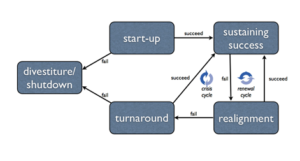- Accelerate Your Learning
Overcoming Learning Disabilities
You might focus too much on the technical side of the business, products, customers, technologies, and strategies, and short-change the critical learning about culture, leadership, and politics. A related problem is a failure to plan to learn. Other new leaders suffer from the ‘action imperative’, a near compulsive need to take action. Being too busy to learn often results in a death spiral. Perhaps most destructive of all, some leaders arrive with ‘the answer’.
Defining Your Learning Agenda
Focus on ‘actionable insights’ – knowledge that enables you to make better decisions.
Identifying the Best Sources of Insight
Hard data (financial statements, employee surveys…) and ‘soft’ information.
When diagnosing a new organisation, start by meeting with your direct reports 1:1, asking them essentially the same five questions:
- What are the biggest challenges facing this organisation, now or in the future?
- Why is the organisation facing, or going to face these challenges?
- What are the most promising unexploited opportunities for growth?
- What would need to happen to exploit the potential of these opportunities?
- If you were me, what would you focus your attention on?
By asking everyone the same set of questions, you can identify prevalent and divergent views, and thus avoid being swayed by the first or most forceful or articulate person you talk to. How people respond can also tell you a lot about your new team and its politics. Who answers directly and who is evasive or prone to going off on tangents? Who takes responsibility and who points fingers? Who has a broad view of the business and who seems stuck in a silo? If you are meeting with salespeople, ask them what our customers want that they are getting from our competitors and are not getting from us?
Creating a Learning Plan
A cyclical learning process in which you collect information, analyse, and distil it, develop hypotheses, and test them, thus progressively deepening your understanding of your new organisation.
Learning About Culture
Symbols (signs to promote solidarity), Norms (shared social rules that guide ‘correct behaviour’), Assumptions (unarticulated beliefs that pervade and underpin social systems). The most relevant assumptions for new leaders involve power and value. Who can legitimately exercise authority and make decisions? What does it take to earn your stripes? Regarding value, what actions are believed by employees to create (and destroy) value?
- Match Strategy to Situation
Diagnosing the Business Situation
The four broad types of business situations that new leaders must contend with are start-up, turnaround, realignment (revitalize something drifting into trouble) and sustaining success (preserving what is already working and taking to next level). This is known as the STaRS model.







 This information will never be shared with third party
This information will never be shared with third party
An amazing read for students. A very thoughtful review. Good work